- Clone
- 15F11 (See other available formats)
- Regulatory Status
- RUO
- Other Names
- Junction Plakoglobin, DP3, Catenin (Cadherin-associated Protein), Gamma 80kDa, Desmoplakin III, CTNNG, PDGB, PKGB, Catenin Gamma
- Isotype
- Mouse IgG1, κ
- Ave. Rating
- Submit a Review
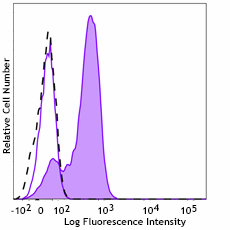
| Cat # | Size | Price | Quantity Check Availability | Save | ||
|---|---|---|---|---|---|---|
| 946405 | 25 tests | $194 | ||||
| 946406 | 100 tests | $382 | ||||
γ-catenin, also referred to as JUP and plakoglobin, is a member of the Armadillo family of proteins that are required for Wnt signaling. γ-catenin was originally described as a structural component of desmosomes and adherens junctions, where it links E-cadherins to the actin cytoskeleton. The presence of this complex is critical for cell migration and adhesion. While γ-catenin shows high overall similarity to the homolologous β-catenin, notably in the armadillo domain rich central region, γ-catenin has distinct N- and C-terminal regions, which allows interaction with protein partners functionally distinct with those of other catenins. Additionally, γ-catenin shows tumor suppressor activity by downregulation of oncogenic Wnt signaling. This negative regulation occurs through multiple mechanisms: a. displacement of β-catenin from junctional complexes thereby promoting its ubiquitin-dependent degradation, b. disrupting formation of the TCF- β-catenin transcriptional activator complex by directly binding β-catenin, c. stimulating the nuclear export of the SOX4 transcription factor. γ-catenin also plays a role in maintaining embryonic stem cells in a pluripotent state.
Product DetailsProduct Details
- Verified Reactivity
- Human, Mouse
- Antibody Type
- Monoclonal
- Host Species
- Mouse
- Immunogen
- Full-length recombinant chicken γ-catenin
- Formulation
- Phosphate-buffered solution, pH 7.2, containing 0.09% sodium azide and BSA (origin USA)
- Preparation
- The antibody was purified by affinity chromatography and conjugated with PE under optimal conditions.
- Concentration
- Lot-specific (to obtain lot-specific concentration and expiration, please enter the lot number in our Certificate of Analysis online tool.)
- Storage & Handling
- The antibody solution should be stored undiluted between 2°C and 8°C, and protected from prolonged exposure to light. Do not freeze.
- Application
-
ICFC - Quality tested
- Recommended Usage
-
Each lot of this antibody is quality control tested by intracellular immunofluorescent staining with flow cytometric analysis. For flow cytometric staining, the suggested use of this reagent is 5 µL per million cells in 100 µL staining volume or 5 µL per 100 µL of whole blood. It is recommended that the reagent be titrated for optimal performance for each application.
- Excitation Laser
-
Blue Laser (488 nm)
Green Laser (532 nm)/Yellow-Green Laser (561 nm)
- Application Notes
-
This clone was tested for ICC on MCF7 (positive control) and MOLT-4 (negative control) cells using multiple fixation and permeabilization conditions. A brief summary of these results is listed below:
- methanol only: plasma membrane associated staining in MCF7 cells, no staining in MOLT-4 cells. Moderate nuclear background staining observed in MCF7 cells.
- 4% PFA plus Triton X-100: plasma membrane associated staining in MCF7 cells, no staining in MOLT-4 cells. Low nuclear background staining observed in MCF7 cells.
- 4% PFA plus methanol: 4% PFA plus Triton X-100: plasma membrane associated staining in MCF7 cells, no staining in MOLT-4 cells. Low nuclear background staining observed in MCF7 cells.
- methanol only: plasma membrane associated staining in MCF7 cells, no staining in MOLT-4 cells. Moderate nuclear background staining observed in MCF7 cells.
- RRID
-
AB_2927950 (BioLegend Cat. No. 946405)
AB_2927950 (BioLegend Cat. No. 946406)
Antigen Details
- Structure
- γ-catenin is a 745 amino acid protein with a predicted molecular weight of 82 kD.
- Distribution
-
Ubiquitously expressed/Cytoskeleton and plasma membrane associated
- Function
- Cell to cell adhesion, cell signaling
- Biology Area
- Cell Adhesion, Cell Biology, Cell Motility/Cytoskeleton/Structure, Signal Transduction
- Antigen References
-
- Zhurinksy J, et al. 2000. J Cell Sci. 18:3127.
- Mahendram S, et al. 2013. PLoS ONE. 8:e65320.
- Aktary Z, et al. 2017. Oncotarget. 8:32270.
- Gene ID
- 3728 View all products for this Gene ID
- UniProt
- View information about gamma-Catenin on UniProt.org
Related FAQs
- What type of PE do you use in your conjugates?
- We use R-PE in our conjugates.
Other Formats
View All γ-Catenin Reagents Request Custom Conjugation| Description | Clone | Applications |
|---|---|---|
| Purified anti-γ-Catenin | 15F11 | WB,IHC-P,ICC,ICFC |
| Alexa Fluor® 647 anti-γ-Catenin | 15F11 | ICFC |
| PE anti-γ-Catenin | 15F11 | ICFC |
Compare Data Across All Formats
This data display is provided for general comparisons between formats.
Your actual data may vary due to variations in samples, target cells, instruments and their settings, staining conditions, and other factors.
If you need assistance with selecting the best format contact our expert technical support team.
-
Purified anti-γ-Catenin
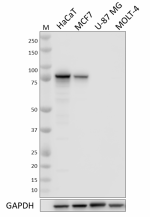
Whole cell extracts (15 µg total protein) from HaCaT and MCF... 
IHC staining of purified anti-γ-Catenin antibody (clone 15F1... 
MOLT-4 cells (negative control) (panel A) and MCF7 cells (po... 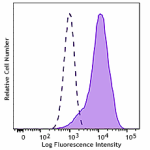
MCF7 cells (filled histogram, positive control) and U-87 MG ... -
Alexa Fluor® 647 anti-γ-Catenin
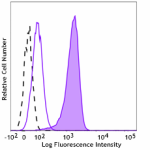
MCF7 cells (positive control) (filled histogram) and MOLT-4 ... -
PE anti-γ-Catenin
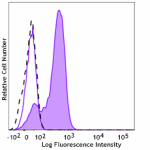
MCF7 cells (positive control) (filled histogram) and MOLT-4 ...

 Login/Register
Login/Register 

















Follow Us